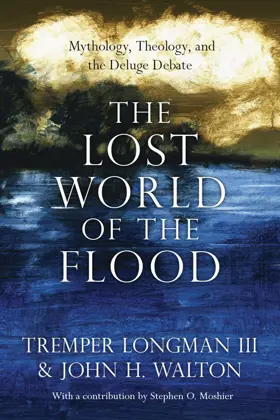

The Lost World of the Flood Mythology, Theology, and the Deluge Debate
Pages
192
Publisher
InterVarsity Press
Published
2018
ISBN-13
9780830852000
In modern times the Genesis flood account has been probed and analyzed for answers to scientific, apologetic, and historical questions. It is a text that has called forth "flood geology," fueled searches for remnants of the ark on Mount Ararat, and inspired a full-size replica of Noah's ark in a theme park. Some claim that the very veracity of Scripture hinges on a particular reading of the flood narrative. But do we understand what we are reading?
Longman and Walton urge us to ask what the biblical author might have been saying to his ancient audience. Our quest to rediscover the biblical flood requires that we set aside our own cultural and interpretive assumptions and visit the distant world of the ancient Near East. Responsible interpretation calls for the patient examination of the text within its ancient context of language, literature, and thought. And as we return from that lost world to our own, we will need to ask whether geological science supports the notion of flood geology.
To read Longman and Walton is to put our feet on firmer interpretive ground. Without attempting to answer all of our questions, they lift the fog of modernity and allow the sunlight to reveal the true contours of the text. As with other books in the Lost World series, The Lost World of the Flood is an informative and enlightening journey toward a more responsible reading of a timeless biblical narrative.
Longman and Walton urge us to ask what the biblical author might have been saying to his ancient audience. Our quest to rediscover the biblical flood requires that we set aside our own cultural and interpretive assumptions and visit the distant world of the ancient Near East. Responsible interpretation calls for the patient examination of the text within its ancient context of language, literature, and thought. And as we return from that lost world to our own, we will need to ask whether geological science supports the notion of flood geology.
To read Longman and Walton is to put our feet on firmer interpretive ground. Without attempting to answer all of our questions, they lift the fog of modernity and allow the sunlight to reveal the true contours of the text. As with other books in the Lost World series, The Lost World of the Flood is an informative and enlightening journey toward a more responsible reading of a timeless biblical narrative.
- CONTENTS
- Abbreviations
- Preface
- Part I: Method: Perspectives on Interpretation
- Proposition 1: Genesis Is an Ancient Document
- Proposition 2: Genesis 1–11 Makes Claims About Real Events
- Proposition 3: Genesis Uses Rhetorical Devices
- Proposition 4: The Bible Uses Hyperbole to Describe Historical Events
- Proposition 5: Genesis Appropriately Presents a Hyperbolic Account of the Flood
- Proposition 6: Genesis Depicts the Flood as a Global Event
- Part II: Background: Ancient Near Eastern Texts
- Proposition 7: Ancient Mesopotamia Also Has Stories of a Worldwide Flood
- Proposition 8: The Biblical Flood Story Shares Similarities and Differences with Ancient Near Eastern Flood Accounts
- Part III: Text: Understanding the Biblical Text Literarily and Theologically
- Proposition 9: A Local Cataclysmic Flood Is Intentionally Described as a Global Flood for Rhetorical Purposes
- Proposition 10: The Flood Account Is Part of a Sequence of Sin and Judgment Serving as Backstory for the Covenant
- Proposition 11: The Theological History Is Focused on the Issue of Divine Presence, the Establishment of Order, and How Order Is Undermined
- Proposition 12: The “Sons of God” Episode Is Not Only a Prelude to the Flood; It Is the Narrative Sequel to Cain and Abel
- Proposition 13: The Tower of Babel (Genesis 11:1-9) Is an Appropriate Conclusion to the Primeval Narrative
- Part IV: The World: Thinking About Evidence for the Flood
- Proposition 14: The Flood Story Has a Real Event Behind It
- Proposition 15: Geology Does Not Support a Worldwide Flood (Steve Moshier)
- Proposition 16: Flood Stories from Around the World Do Not Prove a Worldwide Flood
- Proposition 17: “Science Can Purify Our Religion; Religion Can Purify Science from Idolatry and False Absolutes”
- Conclusion
- Notes
- For Further Reading
- Author Index
- Subject Index
- Scripture Index